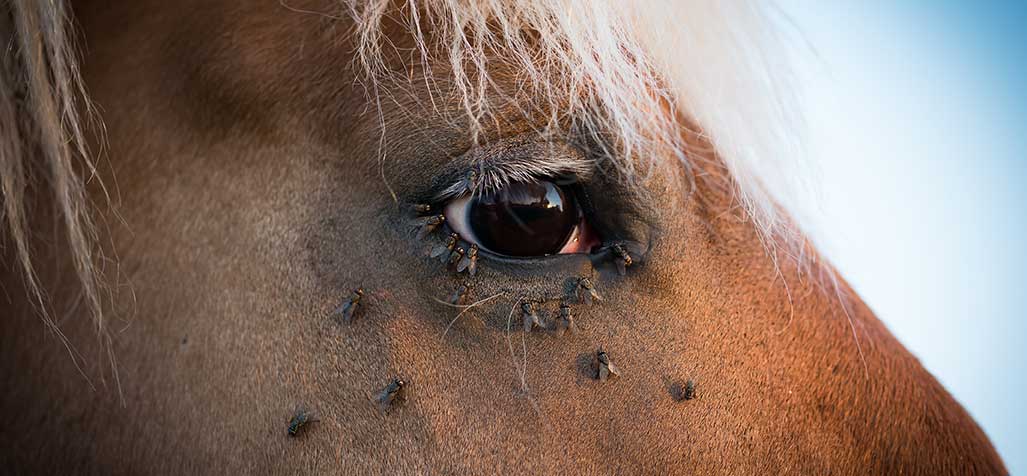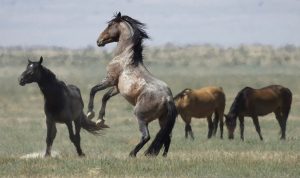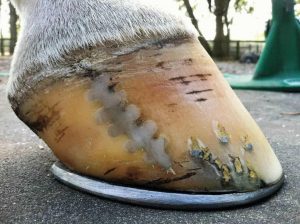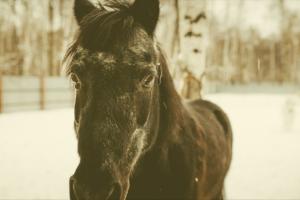7 Ways to Ward Off Flies
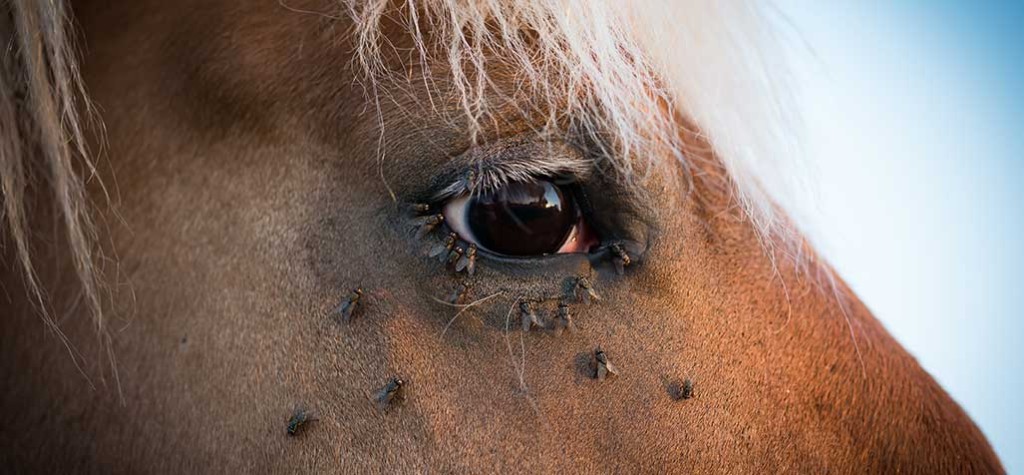
Fly Season!!!!!! Yes, it is here. Every year I read articles and blogs about what to do to protect your horses from flies so I thought I would list a few of the hints I found to be the most helpful. In our 24 horse training barn we see horses of all types, ages, breeds which also goes to say they all have different types of skin sensitivities, allergies, tolerances, etc….
#1 SPRAY IT ON
Obvious, right? However the types of fly sprays available need consideration. If your horse is sensitive to fly sprays- think dandruff looking skin, scaly looking parts on neck, loss of hair around face or other body areas- you may need to consider a more holistic chemical free spray or one that contains Aloe and/or an added sunscreen. Don’t be fooled by non-chemical sprays either….saying something is “all-natural” doesn’t make it more gentle. Pyretherin, an ingredient in most “chemical” fly sprays is technically a “natural” ingredient derived from the chrysanthemum flower and while it is deemed “safe” in small amounts often it is mixed with other chemicals to increase it’s effect. It also can be made synthetically. http://en.wikipedia.org/wiki/Pyrethrin
There are plenty of natural sprays on the market but if you think homemade or holistic/all natural is the route you would like to go to read our article by Liv Gude of Pro Equine Grooms on how to make your own fly spray and you may want to try adding some essential oils to your homemade mix. Oils like Lavender, Peppermint, Lemon, Geranium and Eucalyptus along with Vinegars and citrus that work really well together… you and your horse will smell so nice and goodbye flys!
Overhead systems can be very costly and require maintenance and then you risk the constant chemical infiltration of lungs and on skin. Some barns use these on timers, I shut mine off in my barn as I don’t want to be breathing those chemicals in all day nor do I wish for my horses to either.
#2 GEAR ‘EM UP
You all know what I am talking about, dressing your horse like they are going into a medieval battle. There are sheets. There are boots. There are neck wraps. Belly Bands. Masks, with ears, with nose guards or without. Masks with painted on faces, bug eyes or trendy trims. Do not forget masks for riding. My advice? Find the material that is #1 comfortable to your horse, #2 durable as you will not want to go through 3 a season, #3 please folks, color co-ordinate. What an eyesore to see a chestnut horse wearing red. Or having blue plaid boots mixed with a pink fly sheet. Kidding. (Sort of)
#3 APPLY SOME SALVES
From the all time favorite Pink goo to the holistic versions with Tea Tree oil, Aloe and soothing herbs these salves can protect sensitive areas. Some horse will not keep a mask on so I find these salves or even roll on products to be very helpful around eyes, ears and muzzles. Horses with open wounds are especially susceptible to fly born illness so coating around these areas with salves after applying medication is a really good idea in the event they can not be bandaged. I have also found the underline “itch” spots to respond well to the herbal salves as they act to treat and protect.
#4 KEEP IT CLEAN
Daily cleaning of stalls, paddocks and pastures and removal or composting of manure is key. Flies like stink! The stinkier the better. Keep stall walls washed down and floors disinfected or spread with a product to cut odor or moisture like PDZ or lime (just make sure it doesn’t make contact with horse’s skin-best to move horses out while you do this!) Keep muck buckets, tools, wash racks, grooming areas cleaned and disinfected regularly. I even spray these areas with my holistic blend of spray and it really seems to help.
#5 SET YOUR TRAPS
There is some question whether this works or just attracts more flies. I am told if you keep the traps away from the actual barn and down wind from the barn it does help. They must be kept maintained and checked regularly for replacement. I know others who swear by those little fly larvae eating pests but the trick is you have to have an established place where manure is kept so they may feed on the larvae. For a farm like ours where we have our manure hauled off daily I have not been able to get these little guys to thrive anywhere. Some people still say to shake them out on pasture fence lines and you will have luck. There are also people who swear by hanging plastic bags with water in them and a coin and claim the reflective properties when the sun hits them disorients the flies and keeps them away. It has worked on my patio so…..? I am certain, however, that given even the slightest chance of reaching these my horses would make short work of them!
#6 FEED IT THROUGH
As I am sure you can tell by now I am not a fan of heavy chemicals but there are products that are marketed to add to feeds that claim they will inhibit larval development and greatly reduce adult fly populations in 4-6 weeks. There are several brands on the market and they claim to be safe. There are also many products that contain ingredients that are holistic such as garlic, apple cider vinegar and diatomaceous earth.
#7 SUPPORT THEIR SYSTEMS
Feeding a well rounded supplement designed to support the skin, coat and immune system and a properly pH balanced digestive tract, I find, to be critical to ward off any problems from fly bites or other insects. A horse with a strong immune system will be less susceptible to fly born diseases such as the dreaded Dry Land Distemper(also known as Pigeon Fever). While there are many products on the market, to keep it simple I like to feed an all-in-one supplement like our Grand Premium Plus www.grandpremiumplus.com. I have also used Grand Coat which is excellent for targeting their skin and coats. One of the reasons we love Grand Premium Plus is because it also contains the complete Grand Coat formulas along with six other top formulas in one product – makes it easy for a large barn like ours to feed.

